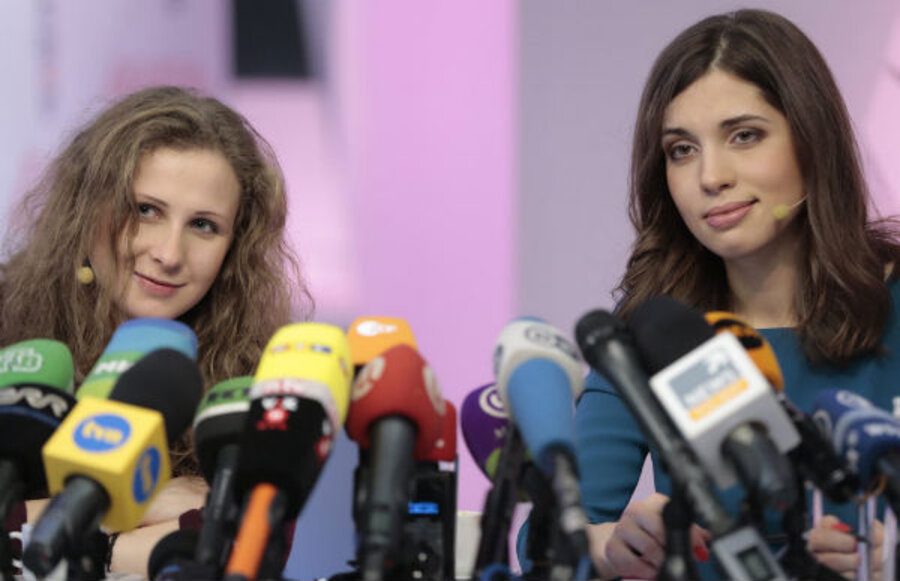Pussy Riot to Putin: Pardons won't save you
Loading...
| Moscow
They haven't given up their dream of ousting Vladimir Putin. But after almost two years in prison they've changed, and they aren't the same people who staged a "punk prayer" in a Moscow church, the two Pussy Riot band members who recently received amnesty said today.
Nadezhda Tolokonnikova and Maria Alyokhina offered no apologies in their first press conference since being released earlier this week. And they kept up the drumbeat of anti-Kremlin defiance that brought them to the center of world attention following their arrest for the 40-second performance that beseeched the Virgin Mary to "drive Putin out," illicitly staged at Moscow's Christ the Savior Cathedral.
But they also revealed plans to move into more serious political activities, including a new prisoners' rights organization to be called Law Zone.
"As far as Vladimir Putin is concerned, our attitude towards him has not changed. We would still like to do what they put us in jail for. We would still like to drive him out," Ms. Tolokonnikova said.
"[But] for us the punk prayer in the Christ the Savior Cathedral is not too important anymore. We are different people now. We lived through a long life in prison. ... This common experience unites us now much more than joint participation in the punk prayer in the Christ the Savior Cathedral."
They dismissed last week's mass amnesty that freed them, alongside former oil tycoon Mikhail Khodorkovsky and thousands of other Russian prisoners, as a Kremlin publicity stunt to deflect criticism from Russia before the upcoming Sochi Winter Olympics.
"With the Olympics approaching, Vladimir Vladimirovich [Putin] does not want his favorite project ruined," Tolokonnikova said. "Whether one likes it or not, going to the Olympics in Russia is an acceptance of the internal political system in Russia, an acceptance of the course taken by a person who's interested in the Olympics above all else – and that is Vladimir Putin."
There is some debate in Moscow about just how relevant Pussy Riot may be, now that they are freed from prison, and whether they can reinvent themselves in a way that will be politically effective.
During their 2012 trial they attracted global sympathy, not so much for staging a performance that offended many religious believers, but for the severity of the criminal charges leveled against them during the instigation supported by the Kremlin and the powerful Russian Orthodox Church. Even the Russian judicial system does not commonly mete out serious jail time for offenses that cause no bodily harm or property damage.
Many global celebrities, including Paul McCartney, Lady Gaga, and Madonna rallied to the band members' defense.
Tolokonnikova recently infuriated Russian authorities and won widespread respect in the human rights community for publishing a detailed and articulate open letter that pulled back the curtain on living conditions in her penal colony.
"These women have had their time in the spotlight, and I doubt they're going to transform themselves into serious political players," says Alexei Mukhin, director of the independent Center for Political Information in Moscow. "There is nothing professional about them. If they try to be serious, they will fail."
But the two women said today that they intend to parlay their fame into efforts to reform Russia's overcrowded and often brutal prison system.
"There are people in [Russian] penal colonies who are on the verge of death," Ms. Alyokhina said.
But the Law Zone project, which would fight for the rights of individual prisoners as well as systemic prison reform, needs money, they said.
And that could be where Pussy Riot's international name recognition comes in. The plight of Russia's almost 1 million prison inmates has not gained much attention, even in Russia, and Pussy Riot's fame could provide a huge boost for efforts to raise funds and focus a spotlight on the issue.
"Our final goal is solidarity, developed civil society, and ability to help each other. We saw all of this while we were in prison and it was a real miracle; we are very grateful to all people who supported us," Tolokonnikova said.








